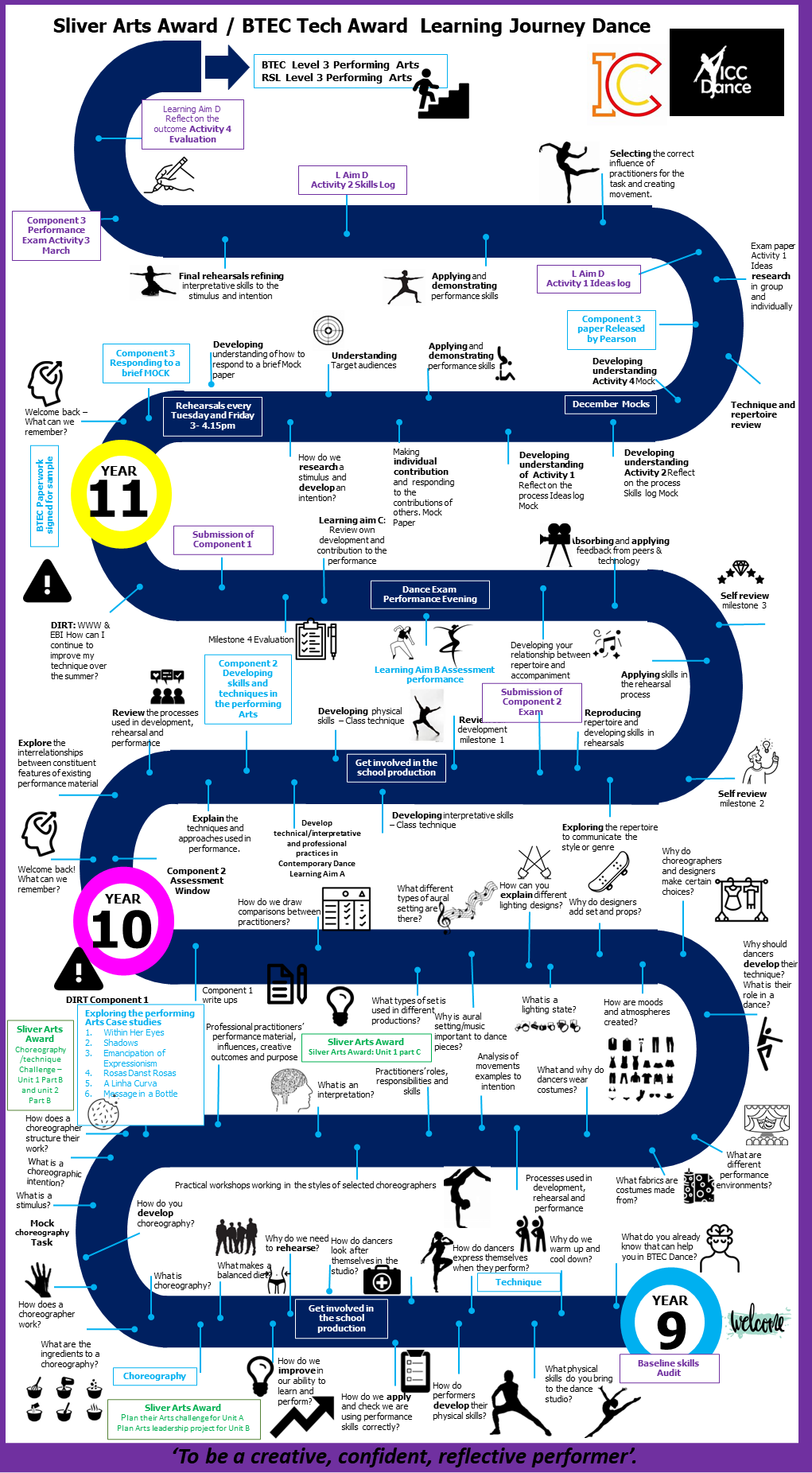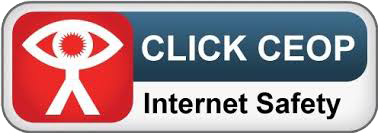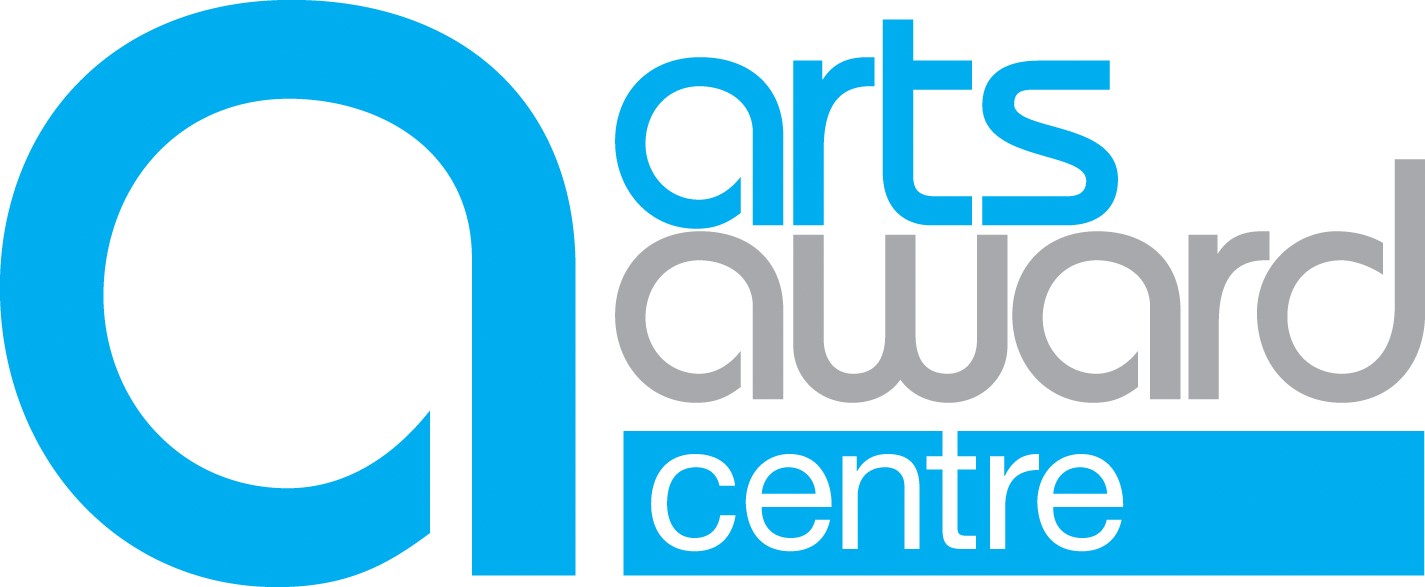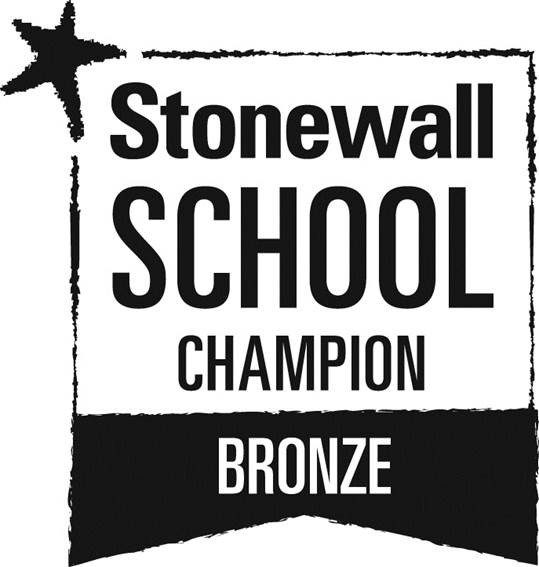Miss Haynes - Subject Leader
Miss McThredder - Dance & Drama
Miss Salter - Drama
Miss Osborne Dance
The Performing Arts Faculty promotes and nurtures creative, confident, and reflective performers. Our broad Performing Arts curriculum inspires, informs, stimulates, and challenges students, enjoying and exploring past and present art forms generated from an array of diverse cultures. A range of topics allows students to develop an understanding and appreciation of the performing arts formed in a contemporary society and throughout the world. These themes are explored through a range of different creative styles and practitioners.
Furthermore, the Performing Arts curriculum promotes a sense of self-worth, encourages confidence, resilience and develops relationships. A wide range of soft skills are embedded throughout the curriculum to transfer into the local and global community. This is recognised as all students to have the opportunity to gain an Arts Awards qualification from Trinity College London during key stage three and key four foundation year.
At Key Stage Three our students are given the opportunity to secure a broad and solid foundation of performing arts knowledge through creative practical exploration and implement the skills that are important for lifelong lessons through a range of performing arts specialism.
At Key Stages Four students develop a deeper understanding of the performing arts: it is culture, background, and influences. The curriculum also provides students with an accurate knowledge of how the performing arts industry operates in today’s society and empowers them to become creative and reflective practitioners. This provides students with the skills needed to flourish in post 16 education including apprenticeships where our soft skills development is relevant to our local community.
At Key Stage Five students develop skills, knowledge and understanding for entry to employment in the performing arts industries or progression to further study at a higher level. The curriculum provides students with a vast range of specialised units developing and embedding skills. Extra-curricular activities help to broaden horizons in terms of creative and employment possibilities. Music at KS5 continues the BTEC pathway with a focus on developing skills which are embedded in industry practice. Students are encouraged to further develop their practical skills and reflect in a deeper way on their burgeoning skillset. Alongside this KS5 also places a greater emphasis on broadening their musical experience and knowledge of a wide range of cultural and historic examples. Students are encouraged to reflect on their progress in a mature and inclusive way.
Additionally, the performing arts curriculum throughout the key stages places an emphasis on written expression and literacy, supporting students to write analytically, creating critical responses, and accurately employing subject related terminology in self-reflections.
We value the support for all parents and carers to their child’s performing arts education and regularly celebrate achievements and provide opportunities to local theatres utilising our locality to London and Brighton.
Developing student’s appreciation of the performing arts both inside and outside the classroom develops discipline, control and focus allowing students to grow into well-rounded adults. Students are introduced to a range of opportunities to develop their expertise through extra-curricular activities including the school musical, Band Camp, Dance and Drama clubs and events within the local community allowing them to develop their professionalism within the performing arts sector.
How do we know what pupils have learnt and how well they have learnt it?
In KS3, pupils' complete summative practical skills assessments for every unit of study. At KS4 and 5, end-of-unit summative assessments are marked by the teacher in exam board assessment windows and sent for moderation. We also use AFL daily in the classroom with a focus on skills across all key stages.
Data for all assessment methods is collated by the teacher and reviewed to identify areas that require reteaching and students that require extra support via intervention and to address any whole class misconceptions. After a practical assessment, students are given individualised verbal feedback and a DIRT lesson is planned. Where students at KS3 use their learning journey booklets to reflect. Through KS4 and KS5 lessons this forms part of the resubmission window using formal written feedback. The outcome of all key stage assessments is discussed in subject / faculty meetings and reviewed in the long-term planning implementing changes where required.
In line with the school policy, summative assessment data is entered onto GO4schools three times in the year. These assessments are cumulative and form the basis of grades reported to parents and students at each Data Entry Point through progress review days.
How we teach what we do
Curriculum Delivery
All subjects are taught by subject specialists. KS4 year 10 and 11 is allocated 5 hours of curriculum time per fortnight. KS4 foundation year is allocated 4 hours per fortnight. KS5 subjects have 9 hours per fortnight. Students are taught practical and theory-based work together, interwoven to enable them to make the links required to be successful in written exams and coursework. In Year 10 and 11, Drama and Dance students have one formal computer room-based lesson focusing on requirements of the written paper/coursework and examination technique. We have an equipped specialist dance studio with mirrors and a drama studio with a lighting rig which is also used as a performance space. There is a large hall with a sound system, lighting rig and teacher computer access. Music has access to 22 computers within their classroom to access F47 computer suite running music software such as Cubase, Logic and BandLab. Students also have access to keyboards, a full set of hand percussion, drum kit, electric guitars, basses electronic drum kit, there is also practice rooms with live-streaming footage back to F47 classroom.
Teaching
Critical thinking
In Dance, students must learn key concepts related to performance, choreography, and analysis. They are required to recall skills and devices and be able to recognise and apply them to their own and others' work.
Students develop the ability to describe in detail, to analyse, evaluate and offer personal interpretations of their own movement and constituent features of professional dance works.
Students develop the ability to learn and apply complicated choreographic principles and concepts to their work and solve choreographic problems and challenges.
The GCSE Drama course is exceptionally challenging where performance skills not only must be demonstrated at an elevated level, but also describe and analyse their own performances and that of professional performers. Students will develop a language in performance and find the vocabulary to define it.
Within the BTEC Tech Award Music students are required to learn key threshold concepts related to performing, composing and analysing. They are required to recall facts and be able to recognize and apply them to their own and others’ work. They will explore a range of musical genres and styles and apply critical analysis.
Students will explore individual and ensemble performance skills and reflect on their instrumental practice and evolving performance skills. Students will develop composing skills over a series of tasks and apply their knowledge of musical elements and genres.
Modelling and explanation
Is a strategy embedded across the faculty in which the teacher demonstrates a new concept or approach to learning and students learn by observing. Whenever a teacher demonstrates a concept for a student, that teacher is modelling, the students then apply and experiment until they master the concept.
Structured practice of key mastery skills
Throughout the faculty students will practice and develop key Physical, Expressive, Vocal, Composing, Listening, Technical and evaluative soft skills. These are repeated and refined individually depending on the student's experience level to ensure all students have the necessary skills to access the curriculum with confidence, creativity, and reflective ability.
Written work is woven throughout the courses alongside retrieval practice to develop analytical skills to write with detailed description reflecting on the performance as a dancer or musician or reviewing like a drama critic using key adjectives to develop a rich and varied vocabulary.
Feedback/Feed Forward
Feedback is continual and ongoing every lesson across the faculty. During practical tasks students are given immediate verbal feedback both Individual and group feedback, by both the teacher and or peers. This ensures students know what they need to do / practice in order to improve their outcomes.
Students in all year groups self-assess using video recordings and develop their peer assessment skills based on key success criteria.
At the end of each half-term (KS3) and sometimes termly for KS4 and KS5, students are assessed against the KS3/KS4 or KS5 criteria where relevant in relation to the skills area, giving them a benchmark of where they sit within grade boundaries. For KS3 this is against their target grade for the end of year 11 and their current progress towards it. At KS3 all students have a ‘Learning Journey’ booklet that tracks their progress under the headings KNOW IT, SAY IT, PROVE IT, LINK IT.
Written marking and feedback are given where required either online or hard copy with modelled answers and writing frames shared on TEAMS. Mark schemes are annotated and provided at KS4 and KS5. Students then remodel answers based on feedback and marking requirements to improve and practice what is required of top band written answers. This DIRT practice is embedded and repeated throughout the KS4 and KS5.
Challenge for every student
Across the faculty students study work in a variety of styles and genres of dance, drama and music often pushing them outside their comfort zone and encourages exploration of techniques not experienced before. All Students have the opportunity and freedom to demonstrate their learning and skills in an individual context to access the higher-grade boundaries
Support and structured feedback enable students with less experience to achieve and aim for the highest grades.
Differentiation is embodied in every lesson to enable students to access the curriculum at their own level whilst providing the stretch and challenge required for them to meet and exceed target grades.
Students are provided with guidance and examples to assist them when experiencing moments of ‘struggle.’ They are then able to apply this knowledge in new situations in order to practice and embody key skills and concepts throughout the course.
Independence and Self-Regulating Learners.
This concept is vital for the success of all students across the faculty. Our intent is for students to be creative, confident self-motivated, independent reflective learners who can apply skills learned to practice inside and outside the classroom to ensure continual improvement.
We build these skills through structured tasks that are broken down and layered. Students are required to extend upon these tasks for homework. During lesson time students work on practical aspects in groups or individually and are encouraged to take ownership of their practice time. Each task set is given specific success criteria and key skills for students to work towards which helps to motivate and ensure an elevated level of activity in the lesson.
Summary how we got to here
The performing arts curriculum is driven by a reflective process. Over the past three years the performing arts curriculum at all key stages has constantly been reviewed and adapted based on lesson observations, unit outcomes, planning reviews in subject meetings, covid gaps, specification changes and exam results. New units at KS3 and a reviewed of the delivery of content at KS4 have been implemented to ensure the skills students need to success in the performing arts are embedded and evolve as they move through the school. The delivery of our curriculum is centred around the knowledge and skills. As a faculty we use blooms Taxonomy action verbs as our learning objective under the heading ‘what, why, how’ and Blooms style questions prompts further thinking as a pedagogical approach to help measure the cognitive development of learners.
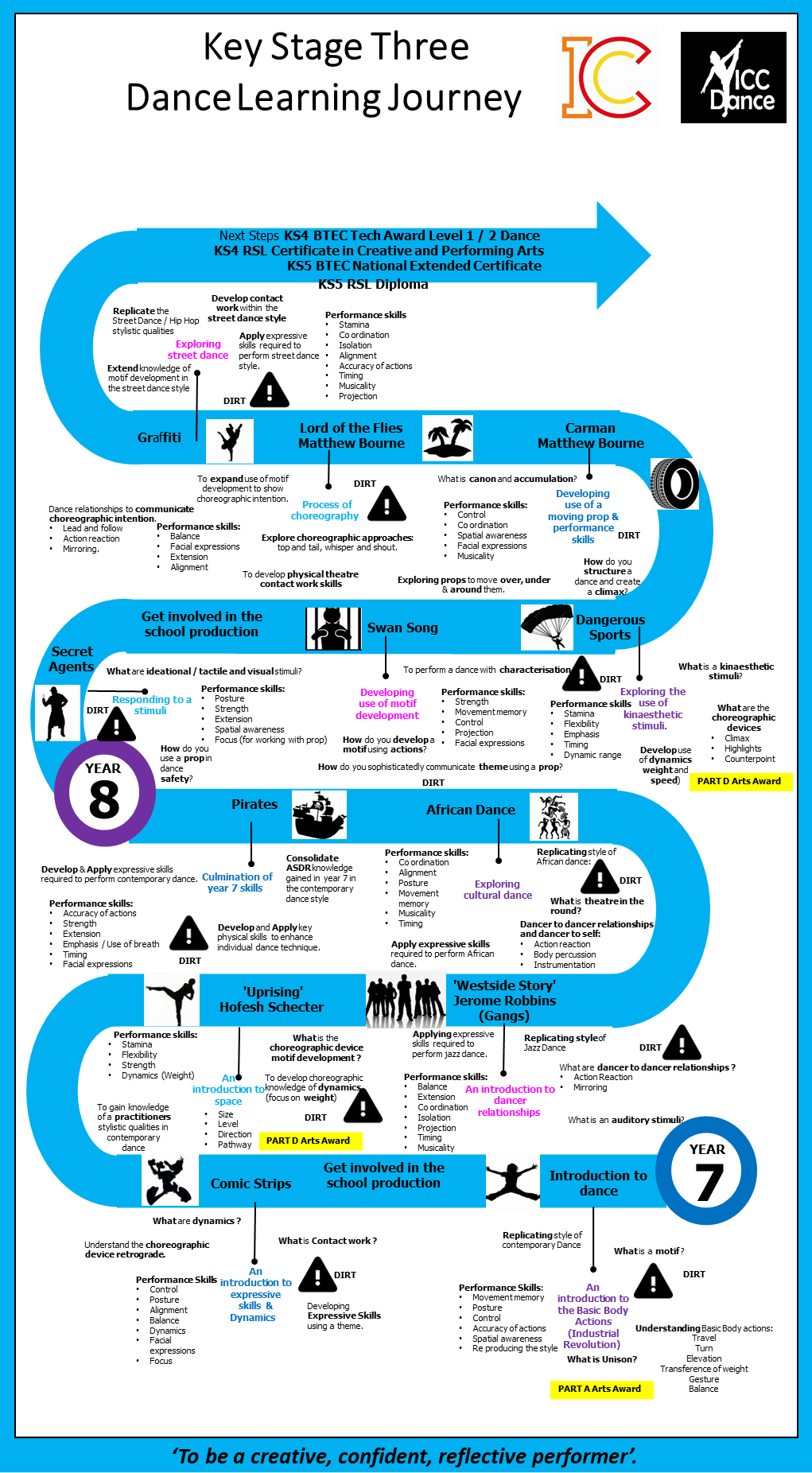
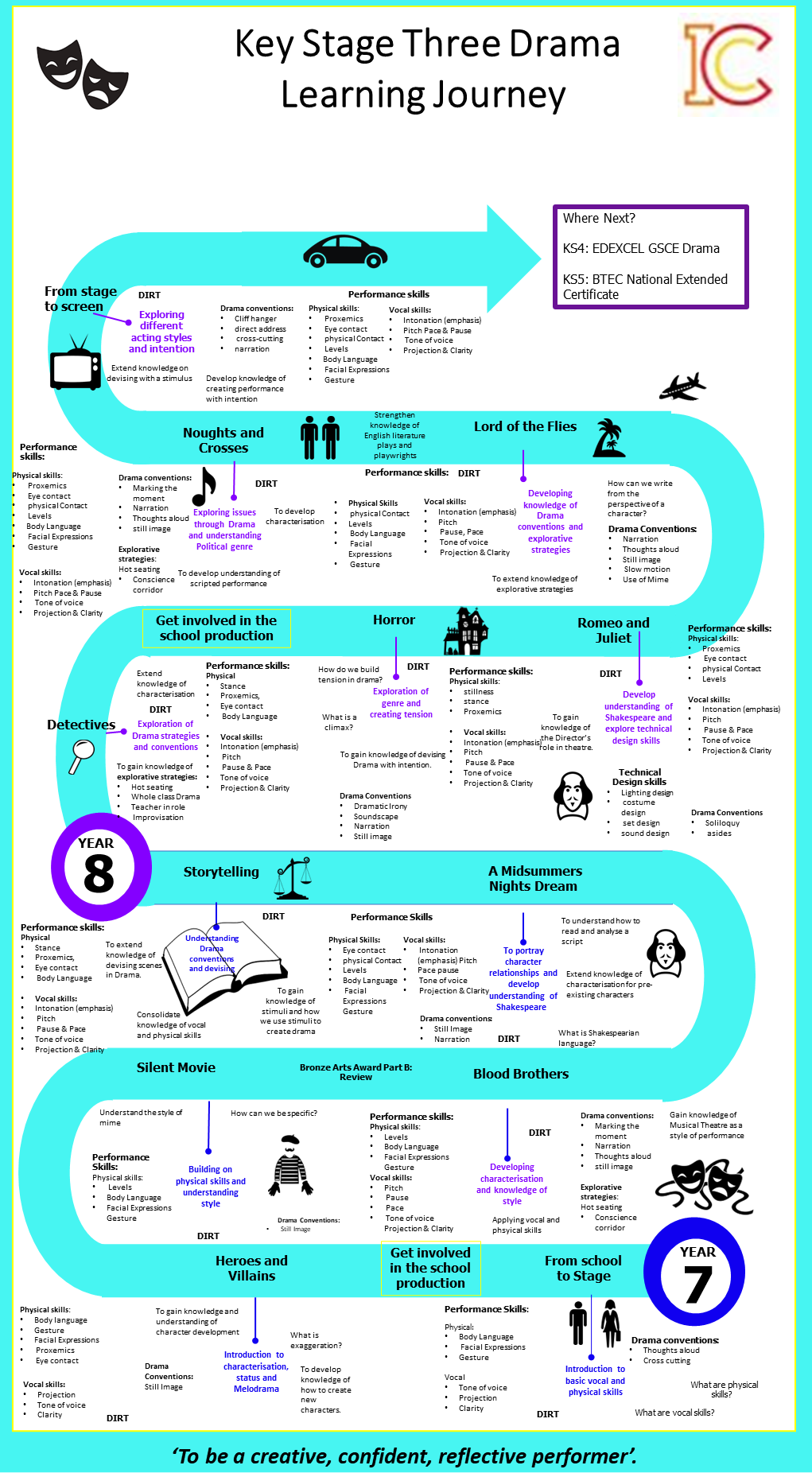
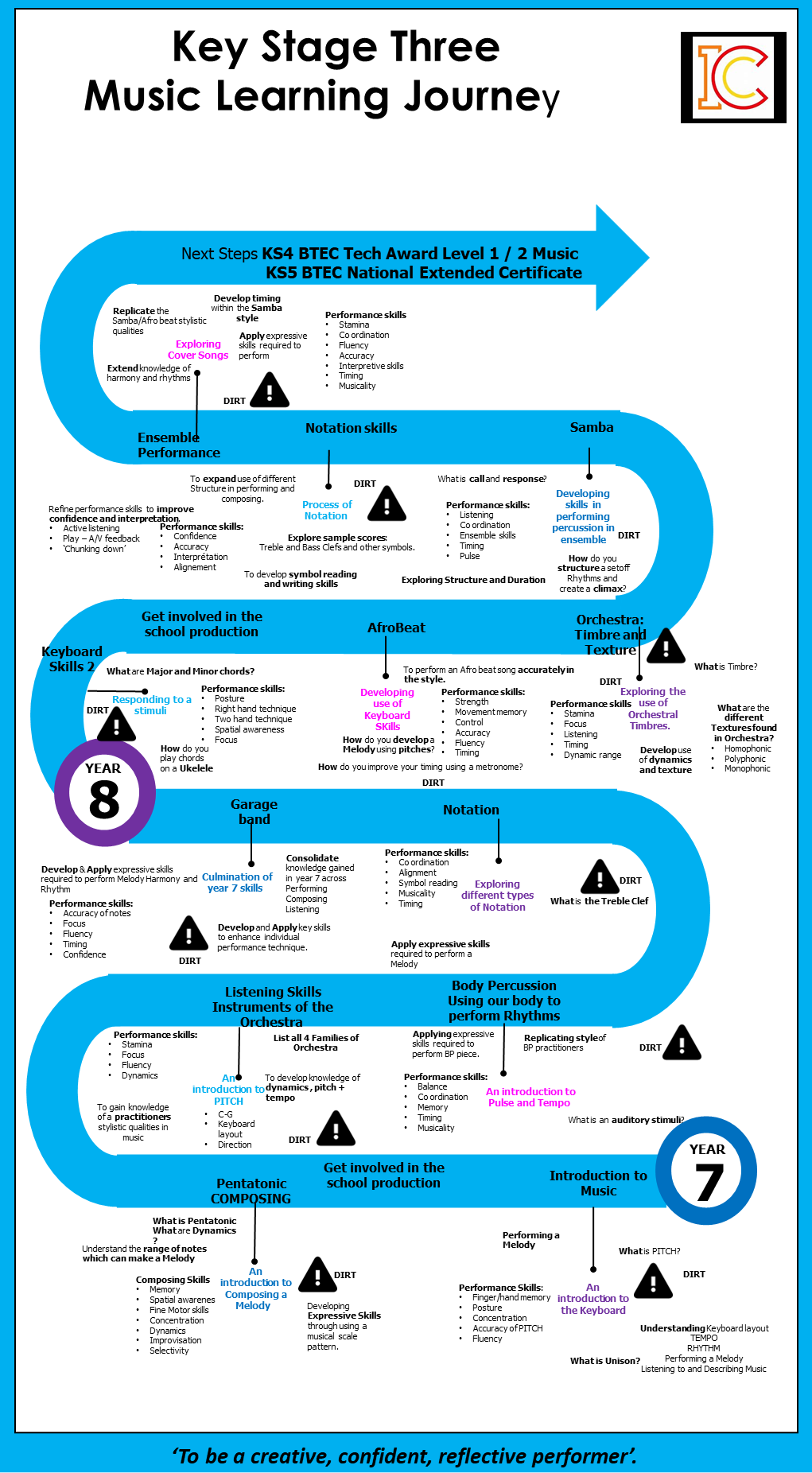

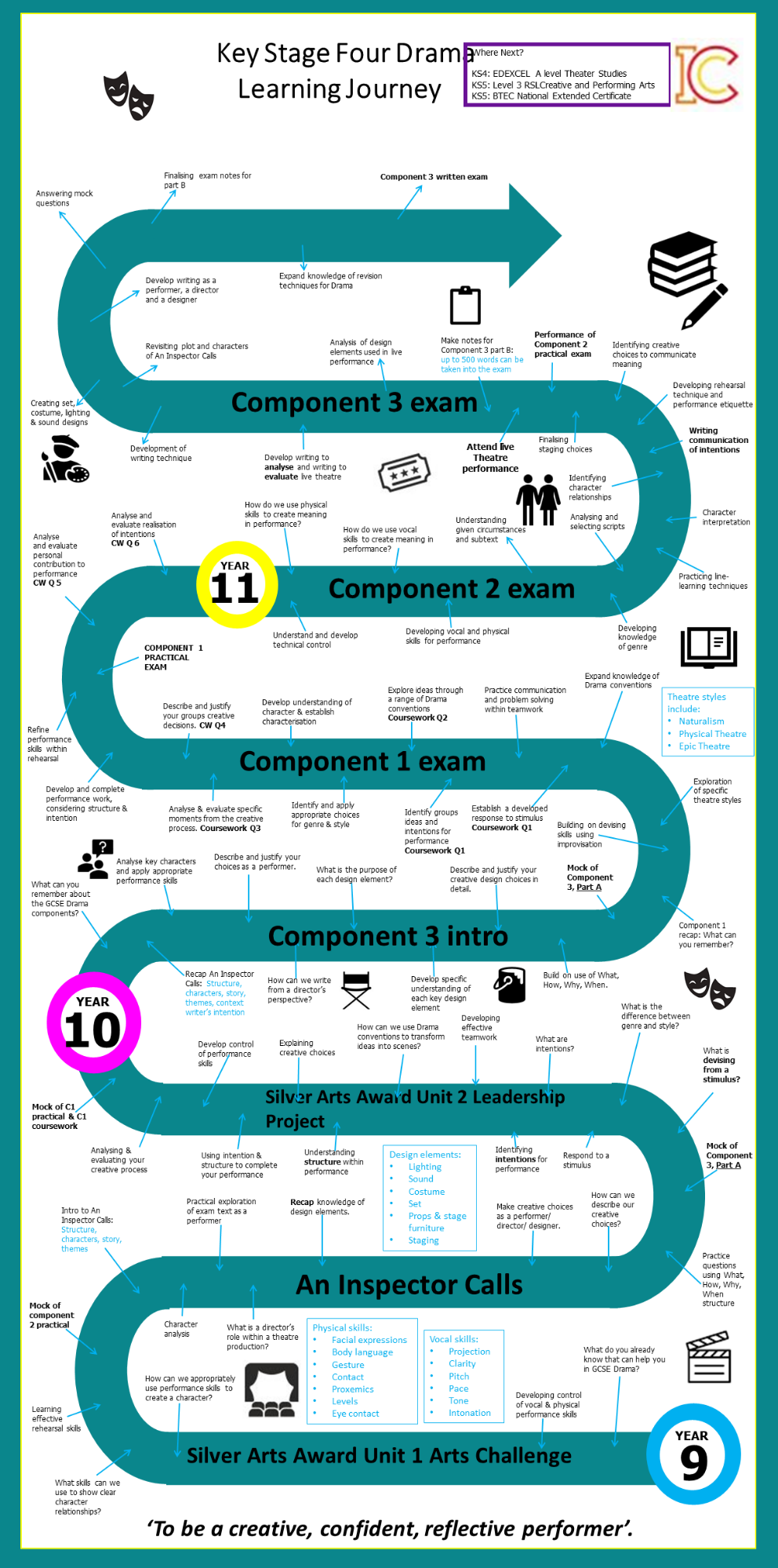
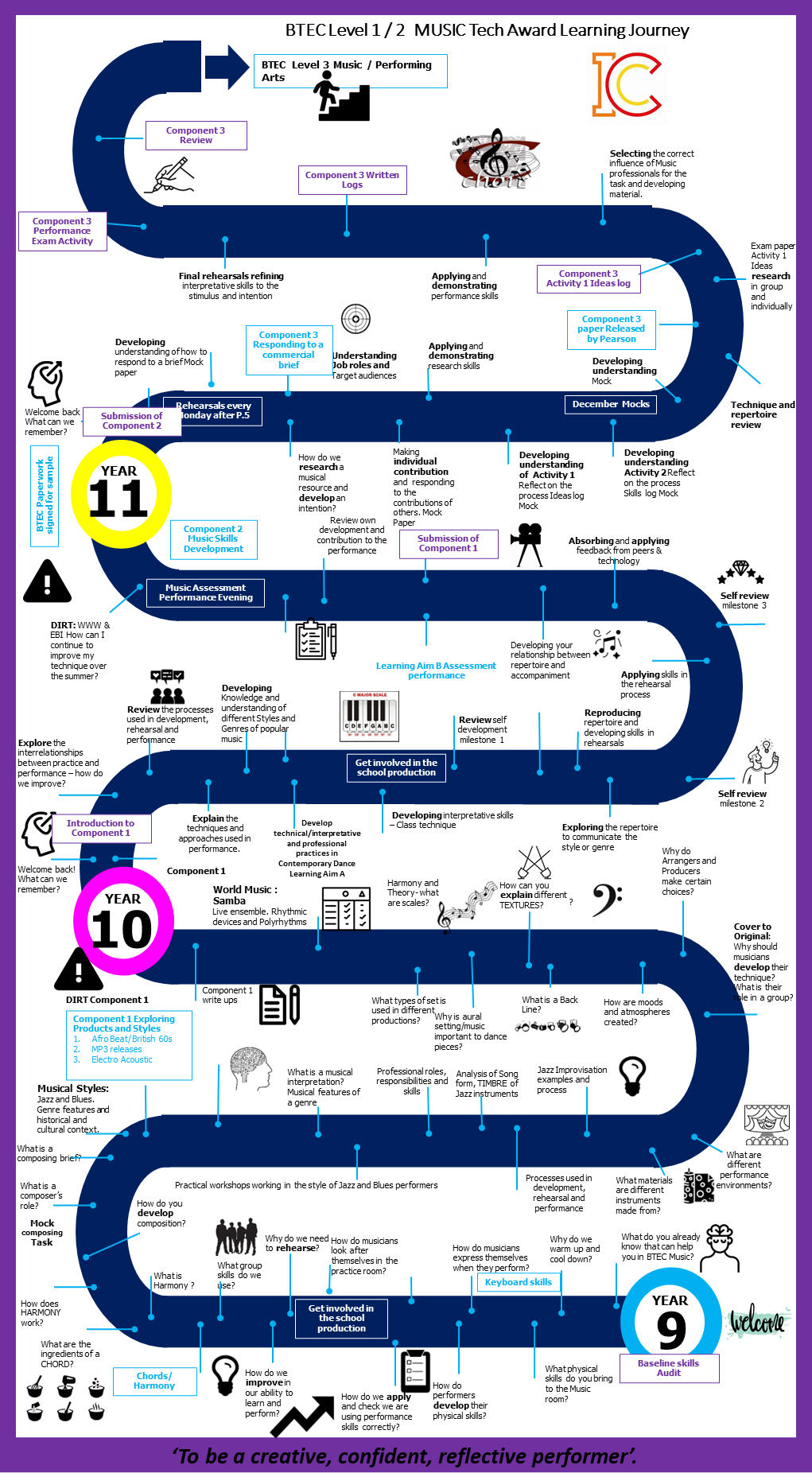
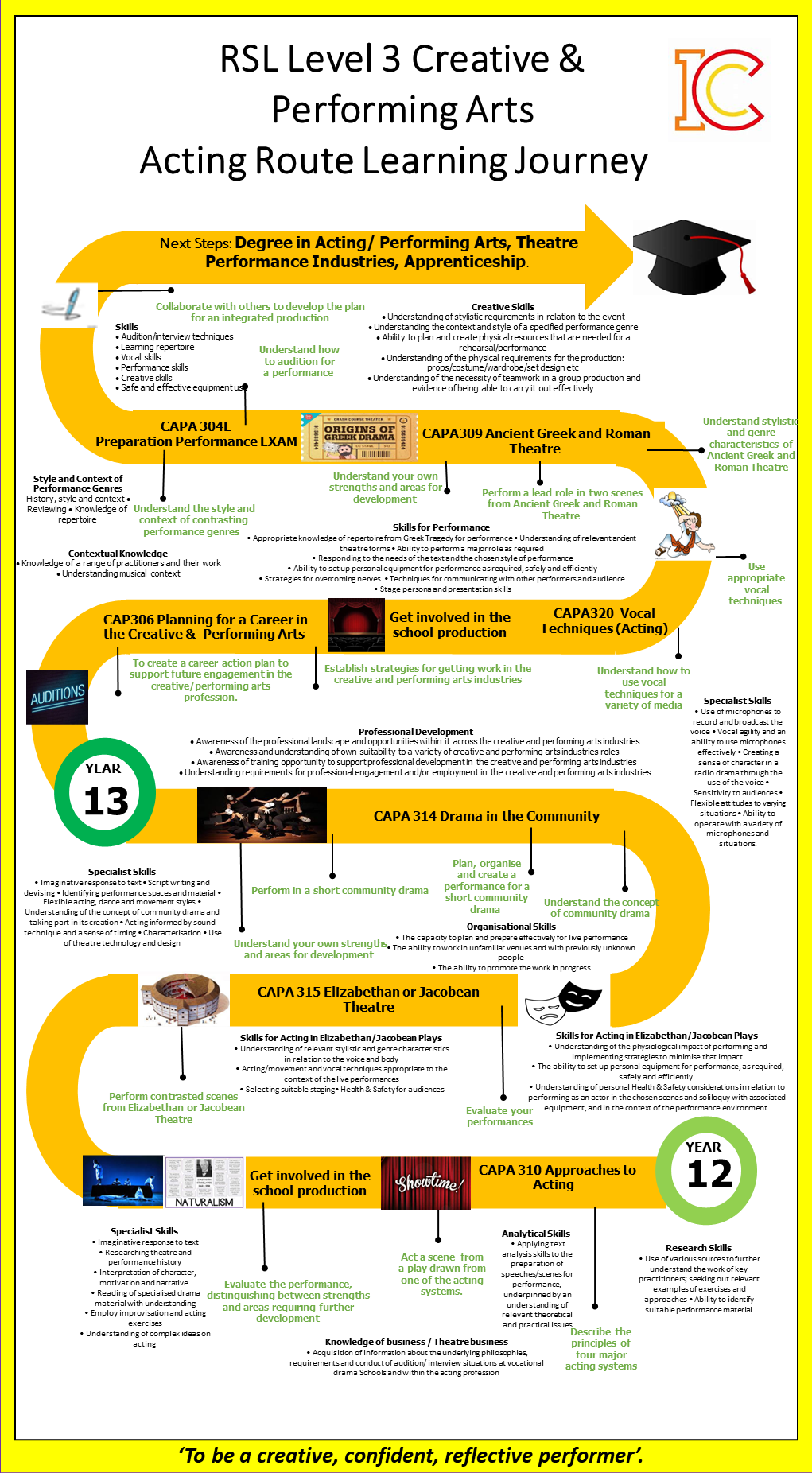
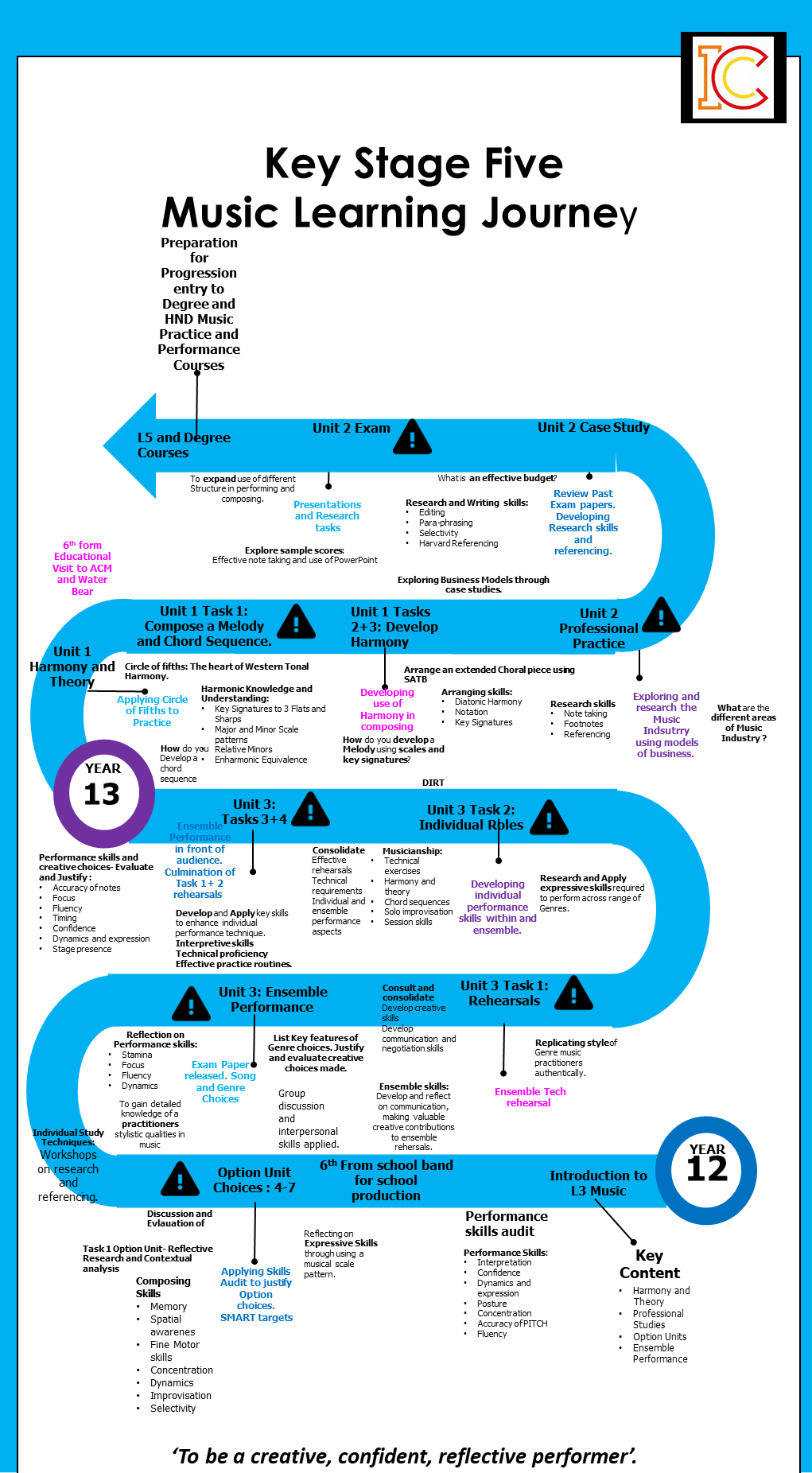
Key Stage 3 Overviews
Key Stage 4 Overviews & Disciplinary Frameworks
Key Stage 5 Overviews
SMSC Performing Arts
Key aspects for Spiritual development in Performing Arts
- Spiritual education in the Performing Arts faculty at Ifield Community College inspires students to develop confidence in, and an understanding of, themselves. All schemes of work across music, drama and dance encourage the students to respond to a range of stimuli with creative independence. The department aims to build students’ self-esteem and enable them to perform in a safe, nurturing and positive learning environment.
- Within the performing arts faculty students look at different genres in class and through homework tasks. Through this, they gain the ability to be reflective about their own beliefs that inform their perspective on life and their interest in and respect for different people’s faiths, feelings and values.
Key aspects for Moral development in Performing Arts
- Moral education in the Performing Arts faculty at Ifield Community College involves students studying a range of current topics and developing an understanding of consequences and moral dilemmas.
- The performing arts faculty encourage students to express their own personal responses and emotional reactions.
- The students can appreciate and examine the work of a range of practitioners across music, drama and dance. The students are given the opportunity to discuss performance and creative outcomes, and are respectful of their peer’s opinions.
Key aspects for Social development in Performing Arts
- Social education in the Performing Arts faculty at Ifield Community College is a highly important element. The department endeavours to develop students into mature, confident, young people.
- The students are able to experience group collaboration with their peers, which enhances social and communication skills.
- In the rehearsal process, students learn that they all share a collective responsibility to the group and recognise the value of effective teamwork. As such, students have to share, improve and discard ideas through co-operation and sensitivity to the feelings and opinions of others.
- Pupils are often required to listen and review one another sensitively in the performance environment. Developing student’s ability to listen, discuss, take constructive criticism from others, and offer constructive criticism in a polite manner through WWW and EBI. The skill and understanding needed to do this is developed overtime through the literacy strategies embedded into the faculty.
- Through extra-curricular activities such as the school production, concert events, dance and drama clubs the performing arts faculty provide a range of opportunities for students to meet together with like-minded individuals as well as providing opportunities for them to meet new people. Cross-curricular projects involving the faculty also develop student’s ability to cooperate well with others and resolve conflicts effectively.
Key aspects for Cultural development in Performing Arts
- Cultural education in the Performing Arts faculty at Ifield Community College develops respect and appreciation of diverse cultural forms.
- Within lessons, students have the opportunity to study a wide range of genres, forms, traditions and styles within the arts. Examples include western classical music; a diverse range of 20th Century music, jazz and blues and world music including African drumming. In drama, students study texts and dramatic art forms from around the world. They can also begin to make connections between different cultures and their own. In dance, the students explore contemporary dance cultures as well as American Jazz dance and African dance.
- The students are able to recognise and appreciate the concept of diversity within both the professional work or repertoire and each other.
- The students develop the ability to value differences in music, drama and dance through a range of performance and creative tasks.
- Students understand and appreciate the cultural influences that have shaped their own heritage as well as those around them.
- Students are willing to participate in, and respond to, artistic and cultural opportunities (trips to theatres and music venues etc.)
Performing Arts and the inclusion of British Values:
- The Performing Arts faculty depends upon the ability to collaborate, contribute and respect each other. These values are fundamental and reiterated throughout lessons.
- The study of dance, drama and music enables students to develop their self-knowledge, self-esteem and self-confidence through exploration of character and theme and different perspectives, creating roles, expressing themselves through dance and music and delivering these to a respectful audience.
- Skills are exercised regularly through group work, whole class work and as individuals when, for example, students may be working on creating choreography, composition or drama when ideas must be shared, decisions made and compromises sought.
- Extra-curricular activities also encompass the concepts of democracy, free choice, working with rules and guidelines and the exploration of other cultures, religions and beliefs. Examples include encouraging students to use school resources independently, taking responsibility for any equipment used; staging of school productions, Christmas events, and dance and drama clubs. These activities contribute to the development of citizenship through behaviours or experience of other cultures and beliefs.
KS5 Performing Arts SMSC
The RSL Creative and Performing Arts KS5 qualification offers practical structured learning with the flexibility to specialise in different disciplines directly relevant to employment within the creative and performing arts industries. SMSC is covered across all units: Approaches to acting, Elizabethan and Jacobean, Draam in the Community, Vocal Techniques, Planning for a career in the performing arts, Greek and roman theatre.
KS5 Music SMSC
The BTEC National and Extended Certificate qualification offer practical structured learning with the flexibility to specialise in different disciplines such as Composition, Performance skills and Improvisation which are directly relevant to employment within the Music industry. SMSC is covered across all units: Ensemble Performance skills, Professional Practice, Harmony and Theory and Options units.
Website Links
http://www.dancedirect.com/uk/Category/Ballet/Leotards/
http://www.aqa.org.uk/subjects/dance/gcse/dance-4230
http://new-adventures.net/matthew-bourne
http://www.shobanajeyasingh.co.uk/
Dance
KS3
Uprising Year 7 Uprising - act I. Hofesh Shechter - YouTube
Cool - West Side Story - Year 7 https://fb.watch/hpUZ8qvz0w/
Car Man Year 8 The Car Man | Official Trailer 2015 - YouTube
Lord of the Flies Year 8 Lord of the Flies (New Adventures) - Official promo trailer April 2014 - YouTube
Swansong - Year 8 Swansong choreographed by Christopher Bruce - music by Philip Chambon - YouTube
Some Like it Hip Hop: Street Dance Year 8 100746-ZOO-SLIHH-Education-Pack_6.pdf (zoonation.co.uk)
KS4
https://zoonation.co.uk/wp/wp-content/uploads/2021/04/100757-ZOO-MIAB-Education-Pack_10.pdf - Message in a Bottle Resource Pack
http://www.ceydatancdance.com/volta - Volta
https://www.facebook.com/watch/live/?ref=watch_permalink&v=10156323639999257 - KAYA Performance
Rosas Danst Rosas
You Tube Links
Shadows
Within Her Eyes
A Linha Curva
Artificial Things
Emancipation of Expressionism
Infra

